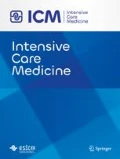References
Wong C-EL, Po-Hsuan L, Huang Y-T, Lee J-S (2022) Brain tissue oxygen tension monitoring for traumatic brain injury: limitations and alternatives. Intensive Care Med. https://doi.org/10.1007/s00134-022-06767-1
Meyfroidt G, Bouzat P, Casaer MP et al (2022) Management of moderate to severe traumatic brain injury: an update for the intensivist. Intensive Care Med. https://doi.org/10.1007/s00134-022-06702-4
Hani L, Ropelato MD, Wagner F et al (2021) Individualized Brain tissue oxygen-monitoring probe placement helps to guide therapy and optimizes outcome in neurocritical care. Neurocrit Care 35:197–209
BOOST-3 | SIREN [Internet] (2021). https://siren.network/clinical-trials/boost-3. Accessed 10 Dec 2021
BONANZA-ANZICS [Internet] (2021). https://www.anzics.com.au/current-active-endorsed-research/bonanza/. Accessed 10 Dec 2021
Payen J-F, Richard M, Francony G et al (2020) Comparison of strategies for monitoring and treating patients at the early phase of severe traumatic brain injury: the multicentre randomised controlled OXY-TC trial study protocol. BMJ Open 10:e040550
Gupta AK, Hutchinson PJ, Al-Rawi P, Gupta S, Swart M, Kirkpatrick PJ, Menon DK, Datta AK (1999) Measuring brain tissue oxygenation compared with jugular venous oxygen saturation for monitoring cerebral oxygenation after traumatic brain injury. Anesth Analg 88:549–553
Andrews PJ, Murugavel S, Deehan S (1996) Conventional multimodality monitoring and failure to detect ischemic cerebral blood flow. J Neurosurg Anesthesiol 8(3):220–226
Robba C, Graziano F, Rebora P et al (2021) (2021) Intracranial pressure monitoring in patients with acute brain injury in the intensive care unit (SYNAPSE-ICU): an international, prospective observational cohort study. Lancet Neurol 20(7):548–558
Chesnut RM, Temkin N, Dikmen S, Rondina C, Videtta W, Petroni G, Lujan S, Alanis V, Falcao A, de la Fuenta G, Gonzalez L, Jibaja M, Lavarden A, Sandi F, Mérida R, Romero R, Pridgeon J, Barber J, Machamer J, Chaddock K (2018) A method of managing severe traumatic brain injury in the absence of intracranial pressure monitoring: the imaging and clinical examination protocol. J Neurotrauma 35(1):54–63. https://doi.org/10.1089/neu.2016.4472
Le Roux P, Menon DK, Citerio G et al (2014) Consensus summary statement of the International Multidisciplinary Consensus Conference on Multimodality Monitoring in Neurocritical Care: a statement for healthcare professionals from the Neurocritical Care Society and the European Society of Intensive Care Medicine. Intensive Care Med 40:1189–1209
Meyfroidt G et al (2022) Correction to: management of moderate to severe traumatic brain injury: an update for the intensivist. Intensive Care Med. https://doi.org/10.1007/s00134-022-06702-4
Funding
No specific funding was obtained for this manuscript. GM is supported Flemish Government (Research Foundation–Flanders (FWO)), as Senior Clinical Researcher (1843118 N) and has project funding from the KU Leuven (C24/17/072).
Author information
Authors and Affiliations
Contributions
GM has written the first draft. Final editing was done by GC.
Corresponding author
Ethics declarations
Conflicts of interest
GM reports no conflict of interest. GC reports grants, personal fees as Speakers’ Bureau Member and Advisory Board Member from Integra and Neuroptics, all outside the submitted work.
Additional information
Publisher's Note
Springer Nature remains neutral with regard to jurisdictional claims in published maps and institutional affiliations.
Geert Meyfroidt and Giuseppe Citerio reply to Wong's correspondence on behalf of all their co-authors.
Rights and permissions
About this article
Cite this article
Meyfroidt, G., Citerio, G. Global and focal monitoring in traumatic brain injury: a never-ending story?. Intensive Care Med 48, 1110–1111 (2022). https://doi.org/10.1007/s00134-022-06789-9
Accepted:
Published:
Issue Date:
DOI: https://doi.org/10.1007/s00134-022-06789-9

